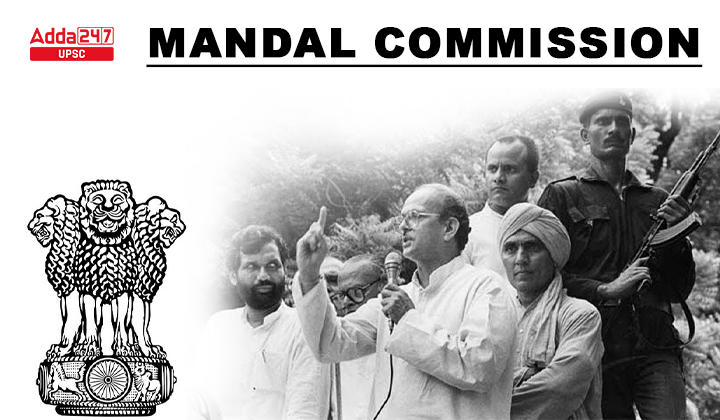Table of Contents
Introduction to Mandal Commission
The Mandal Commission also called the SEBC Commission, was established by the Indian Government on January 1, 1979, under Prime Minister Morarji Desai. It was headed by B.P. Mandal, a Member of Parliament. The primary objective of the commission was to identify the socially and educationally backward classes in India and explore the implementation of reservations to tackle caste-based inequality and discrimination. On December 31, 1980, the commission submitted its report to the President.
What is Mandal Commission?
The Mandal Commission, officially known as the Second Backward Classes Commission, was a commission established by the Government of India in 1979. The commission was tasked with identifying the socially and educationally backward classes (SEBCs) in India and recommending measures to address their underrepresentation in government employment and educational institutions.
The commission was named after its chairman, B.P. Mandal, a former parliamentarian. It conducted an extensive survey and analysis to identify SEBCs based on various social, economic, and educational indicators. The Mandal Commission report, submitted in 1980, identified a list of 3,743 castes or communities as socially and educationally backward.
The most significant recommendation of the Mandal Commission was the reservation of 27% of government jobs and seats in educational institutions for SEBCs. This recommendation aimed to provide equitable representation to historically disadvantaged communities and promote social justice. The implementation of this recommendation led to widespread protests and debates across the country, with both supporters and opponents expressing their views.
Eventually, in 1990, the Government of India implemented the Mandal Commission recommendations through a constitutional amendment, which introduced the concept of Other Backward Classes (OBC) reservations. The 27% reservation for OBCs in central government jobs and educational institutions became effective, and it continues to be in place to this day.
The Mandal Commission and its recommendations played a significant role in reshaping the socio-political landscape of India. It aimed to address the historical disadvantages faced by certain communities and ensure greater inclusivity and representation in government and educational institutions.
Impact of Mandal Commission on Indian Society and Politics
One of the most important impacts of the Mandal Commission was to increase the political representation of OBCs. The reservation of seats in government jobs and educational institutions gave OBCs a greater voice in the political process, and they have since become a major force in Indian politics. The Mandal Commission also had a significant impact on social mobility. The reservation of seats has helped to open up opportunities for OBCs in education and employment, and this has led to a gradual improvement in their social status.
However, the Mandal Commission has also been criticized for its focus on caste. Critics argue that the commission’s recommendations have reinforced caste divisions in Indian society and that they have led to a situation where OBCs are now competing with each other for a limited number of reserved seats.
Overall, the Mandal Commission has had a mixed impact on Indian society and politics. While it has undoubtedly helped to improve the social and economic status of OBCs, it has also led to some negative consequences, such as the reinforcement of caste divisions. Here are some of the specific impacts of the Mandal Commission:
- Increased political representation of OBCs
- Improved social mobility for OBCs
- Reinforcement of caste divisions
- Increased social and economic tensions
- Politicization of caste
The Mandal Commission is a complex and controversial issue, and its full impact is still being debated. However, there is no doubt that it has had a significant impact on Indian society and politics.
Mandal Commission recommendations
According to the Mandal Commission, approximately 52% of India’s population belonged to Other Backward Classes (OBCs). Initially, the commission proposed that the reservation percentage for government jobs should align with this figure. However, this conflicted with a previous Supreme Court ruling that limited reservations to under 50%.
Considering the existing 22.5% reservation for Scheduled Castes (SCs) and Scheduled Tribes (STs), the reservation for OBCs was capped at 27%. This addition, combined with the existing reservations, ensured that the total reservation remained below the 50% threshold. The commission also recognized the backward classes among non-Hindus. Here is a summary of the commission’s recommendations:
- 27% reservation for OBCs in the public sector and government jobs for individuals who do not qualify based on merit.
- 27% reservation for OBCs in promotions at all levels within the public service.
- Unfilled reserved quotas should be carried forward for three years and then opened up to deserving candidates.
- OBCs should receive the same age relaxation benefits as SCs and STs.
- A roster system, similar to the one for SCs and STs, should be implemented for backward classes.
- Reservations should be implemented in public sector undertakings, banks, private sector enterprises receiving government grants, colleges, and universities.
- The government should enact necessary legal provisions to implement these recommendations.
Current Status and Relevance of Mandal Commission
The Mandal Commission is still relevant in India today, although its recommendations have been implemented with some modifications. The reservation of seats in government jobs and educational institutions for OBCs has helped to improve their social and economic status, and they have become a major force in Indian politics.
However, the Mandal Commission has also been criticized for its focus on caste. Critics argue that the commission’s recommendations have reinforced caste divisions in Indian society and that they have led to a situation where OBCs are now competing with each other for a limited number of reserved seats.
The current status of the Mandal Commission is that its recommendations are still being implemented, but there is ongoing debate about the extent to which they should be implemented. Some people argue that the reservation of seats should be increased, while others argue that it should be decreased or even abolished altogether. The Mandal Commission is a complex and controversial issue, but it is one that is likely to continue to be debated for many years to come. Here are some of the current challenges and issues related to the Mandal Commission:
- The question of whether the reservation of seats should be extended to private sector jobs and educational institutions.
- The question of whether the creamy layer of OBCs should be excluded from the reservation benefits.
- The question of whether the reservation system should be abolished altogether.
These are just some of the challenges and issues that are currently being debated in relation to the Mandal Commission. It is likely that these challenges will continue to be debated for many years to come, as the Mandal Commission remains a controversial and complex issue in Indian society.
| Follow US | |
| UPSC Govt. Jobs UPSC Current Affairs UPSC Judiciary PCS Download Adda 247 App here to get the latest updates |



 TSPSC Group 1 Question Paper 2024, Downl...
TSPSC Group 1 Question Paper 2024, Downl...
 TSPSC Group 1 Answer key 2024 Out, Downl...
TSPSC Group 1 Answer key 2024 Out, Downl...
 UPSC Prelims 2024 Question Paper, Downlo...
UPSC Prelims 2024 Question Paper, Downlo...





